2020 年人教版九年级英语全册知识点Unit14
人教版九年级全一册英语 Unit 14 重点语法知识点复习提纲

人教版九年级全一册英语Unit 14 重点语法知识点复习提纲Unit 14 I remember meeting all of you in Grade 7.一、【精选单词】:degree, gentleman, instruction,keyboard, level, manager, row,secretary, standard, survey, task,text, wing,congratulate, double, separate,shall, overcome,in a row, make a mess, believe in,be responsible for二、【重点短语】:1.do a survey 做调查2.play the keyboard 演奏电子乐器3.help sb. With sth. 帮助某人做……4.win a prize 获奖5.in a row 连续几次地6.take a break 休息7.be patient with sb. 对某人耐心8.work out 算出,解决好9.no matter how 无论怎样10.do better in 在……做得更好11.because of 因为12.put in more effort 付出更多的努力13.go shopping 去购物14.look back at 回首(往事);回忆;回顾15.make a mess 弄得一团糟(一塌糊涂)16.keep one’s cool 沉住气;保持冷静17.prepare for 为……做准备18.senior high (school) 高中19.go by (时间)逝去;过去20.believed in 信任;信赖21.look forward to 盼望22.be thirsty for 渴望;渴求23.be thankful to sb. 对某人心存感激24.first of all 首先25.ahead of 在……前面26.along with 连同;除……以外还27.be responsible for 对……有责任;负责任28.set out 出发;启程29.be responsible for 对……感到骄傲30.give up 放弃31.make mistakes 犯错误32.separate from 分离;隔开三、【重点句式】:1.I remember meeting this group of friends .我记得见过这群朋友。
人教版英语九年级unit14知识点

人教版英语九年级unit14知识点Unit 14: Knowledge Introduced in the 9th Grade English TextbookIn the 9th-grade English textbook, Unit 14 focuses on various knowledge points that students need to understand and apply. These knowledge points cover different aspects of the English language, including grammar, vocabulary, and reading comprehension. Let's explore some of these essential points together.1. Grammar: Passive VoiceOne important grammar concept introduced in Unit 14 is the passive voice. The passive voice is used when the subject of the sentence undergoes an action, rather than performing it. For example, instead of saying "The boy broke the window," we can say "The window was broken by the boy." In this way, the emphasis is on the window, not the boy. Understanding the passive voice allows students to express ideas in a more versatile manner.2. Vocabulary: Synonyms and AntonymsExpanding vocabulary is crucial for language learning. Unit 14 includes the study of synonyms and antonyms. Synonyms are words that have similar meanings, while antonyms are words with opposite meanings. For instance, the word "brave" (synonym) can be replaced with "courageous" or "fearless." On the other hand, "happy" (antonym) can be contrasted with "sad" or "unhappy." Mastering synonyms and antonyms helps students communicate more effectively and express themselves with nuance.3. Reading Comprehension: InferenceUnit 14 also emphasizes the skill of making inferences while reading. Inference refers to drawing conclusions based on the given information and one's background knowledge. By making inferences, students can understand the implicit meaning behind the text and enhance their comprehension skills. For instance, if a passage mentions that someone is carrying an umbrella and wearing a raincoat, we can infer that it is likely raining outside. Practicing inference enhances critical thinking and helps students become more engaged readers.4. Grammar: Conditional SentencesAnother grammar point covered in Unit 14 is conditional sentences. Conditional sentences express hypothetical situations or consequences that depend on certain conditions. They consist of an "if" clause (the condition) and a main clause (the result). For example, "If it rains, I will stay at home." Understanding conditional sentences allows students to express possibilities and predictions more accurately.5. Vocabulary: Idioms and Phrasal VerbsIdioms and phrasal verbs are essential in expanding language fluency. Unit 14 introduces several idiomatic expressions and phrasal verbs. Idioms are groups of words with a figurative meaning that cannot be deciphered from their individual words, such as "break a leg" (good luck) or "hit the nail on the head" (saying something correctly). Phrasal verbs are combinations of verbs and particles, like "give up" (surrender) or "take off" (remove or depart). Learning and using idioms and phrasal verbs adds depth to students' language skills.In conclusion, Unit 14 in the 9th-grade English textbook covers a range of knowledge points that are vital for language learning. From grammar concepts like passive voice and conditional sentences to vocabulary expansion through synonyms, antonyms, idioms, and phrasal verbs, students are exposed to various language aspects.Additionally, the focus on reading comprehension skills, particularly inference, promotes critical thinking and strengthens overall language abilities. By mastering these knowledge points, students can enhance their English proficiency and communicate more effectively.。
人教版英语九年级unit 14知识点

人教版英语九年级unit 14知识点Unit 14 Knowledge PointsIn this unit, we will explore various knowledge points covered in the ninth grade English textbook published by People's Education Press (人教版). Here, we will delve into the key concepts and ideas introduced in Unit 14. It is important to note that the format of this article will not strictly follow the textbook's layout, but it aims to effectively communicate the knowledge points in a clear and organized manner.1. Understanding CultureUnit 14 of the ninth-grade English textbook focuses on the theme of "Culture." It aims to broaden students' understanding of different cultures and promote intercultural communication. The unit covers topics such as traditional festivals, cultural exchanges, and customs from around the world.2. Vocabulary and GrammarUnit 14 also introduces new vocabulary words and grammar structures to enhance students' language proficiency. Some of the key vocabulary words include "custom," "tradition," "symbol," and "belief." These words are essential for students to comprehend the cultural concepts discussed in the unit.In terms of grammar, students will learn about the passive voice, comparatives and superlatives, and reported speech. Understanding these grammar points is crucial for students to express their ideas accurately and effectively.3. Reading ComprehensionUnit 14 provides several reading passages that aim to improve students' reading comprehension skills. These passages are designed to expose students to a variety of cultural topics, such as Chinese New Year, Thanksgiving, and the Olympic Games.Through reading and analyzing these texts, students can gain a deeper understanding of different cultures and traditions. Additionally, comprehension exercises are provided to test students' understanding of the passages and reinforce their reading skills.4. Listening and SpeakingUnit 14 places great emphasis on listening and speaking skills. Listening exercises are included to help students develop their ability to understand spoken English in various contexts. These exercises feature dialogues, interviews, and speeches related to cultural topics.To enhance speaking skills, students engage in communicative activities where they discuss their own cultures, share experiences, and give presentations on different customs. This allows students to practice expressing themselves and communicating their ideas fluently in English.5. Writing PracticeUnit 14 also provides opportunities for students to improve their writing skills by focusing on descriptive and informative texts. Students are guided to write about a cultural festival, compare traditions, or share their cultural experiences.Writing tasks in this unit promote creativity, critical thinking, and language development. By engaging in these activities, students canreinforce their writing abilities and deepen their understanding of cultural diversity.ConclusionUnit 14 of the ninth-grade English textbook published by People's Education Press offers a comprehensive exploration of various knowledge points related to culture. Through vocabulary and grammar exercises, reading comprehension activities, listening and speaking tasks, and writing practice, students can broaden their horizons and enhance their language skills.This unit serves as a platform for students to appreciate the richness of different cultures and embrace diversity. By engaging with the content in Unit 14, students can develop a global perspective and become competent communicators in the English language.。
人教版英语九年级全册单元unit 14 知识点+测试卷+思维导图
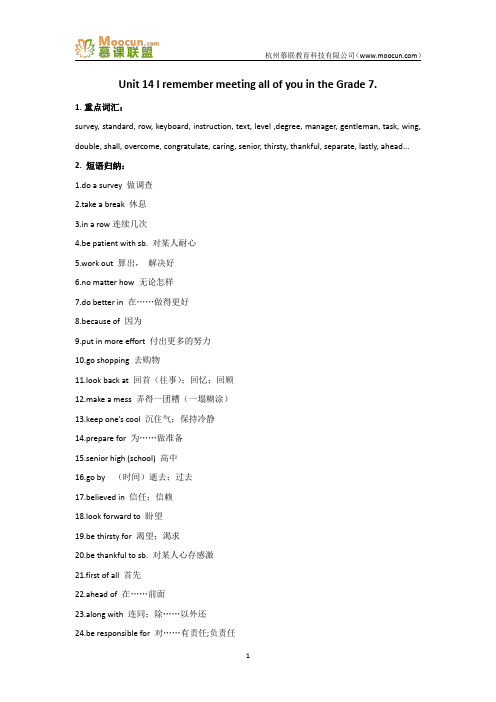
Unit 14 I remember meeting all of you in the Grade 7.1.重点词汇:survey, standard, row, keyboard, instruction, text, level ,degree, manager, gentleman, task, wing, double, shall, overcome, congratulate, caring, senior, thirsty, thankful, separate, lastly, ahead... 2. 短语归纳:1.do a survey 做调查2.take a break 休息3.in a row连续几次4.be patient with sb. 对某人耐心5.work out 算出,解决好6.no matter how 无论怎样7.do better in 在……做得更好8.because of 因为9.put in more effort 付出更多的努力10.go shopping 去购物11.look back at 回首(往事);回忆;回顾12.make a mess 弄得一团糟(一塌糊涂)13.keep one’s cool 沉住气;保持冷静14.prepare for 为……做准备15.senior high (school) 高中16.go by (时间)逝去;过去17.believed in 信任;信赖18.look forward to 盼望19.be thirsty for 渴望;渴求20.be thankful to sb. 对某人心存感激21.first of all 首先22.ahead of 在……前面23.along with 连同;除……以外还24.be responsible for 对……有责任;负责任25.set out 出发;启程3. 必背典句:1. I think that I’ll have to study much harder for exams.我想我将不得不更加努力地学习考试。
人教版英语九年级全册Unit 14知识点详解及练习

Unit14 I remember meeting all of you in Grade 7 1. survey /ˈsɜ:veɪ/ vt.调查;勘测汉译英:(1) 我建议他们应该做一些实验,或至少做一项调查。
_______________________________________________________________ (2) 学生们正在对他们的饮食习惯进行校园调查._______________________________________________________________【参考答案】(1) I suggested they do some experiments, or at least a survey.(2) The students are doing a school survey about their eating habits.2. help /help/ vt.& vi. 帮助;有助于(1) 他帮着筹集了很多钱。
_______________________________________________________________ (2) 我不禁为这个可怜的男人感到难过。
_______________________________________________________________ (3) 在Tom的帮助下我成功了。
_______________________________________________________________【参考答案】(1) He has helped to raise a lot of money.(2) I can't help feeling sorry for the poor man.(3) With the help of Tom, I succeeded.3. strict /strɪkt/ adj. 精确的;绝对的;严格的如果对孩子要求太严,他们会很害怕。
人教版九年级英语Unit14知识点梳理及语法讲义(学生版)

九年级英语Unit 14知识点与语法精讲精练词汇梳理(一)完成单词梳理:名词:1. 调查 2. 标准;水平 3. 一排;一列;一行4. 键盘5. 方法;措施6. 指示;命令7. 课文;文本8. 水平9. (大学)学位;度数;程度10. 经营;管理者11. 先生;绅士12. 毕业13. 典礼;仪式14. 任务;工作15. 翅膀;翼动词:1. 将要;将会 2. 克服;战胜 3. 毕业;获得学位4. 祝贺形容词:1. 体贴人的;关心他人的 2. 级别(或地位)高的3. 渴望的;口渴的4. 感谢;感激5. 有责任心的副词:1. 最后 2. 向前面;在前面代词:1. 我们的兼类词:1. (v)加倍;是……两倍(adj)两倍的;加倍的2. (adj)单独的;分离的(v)分开;分离(二) 词汇变形小结:1. instruct (v. 指示;命令) — (n. 指示;命令)2. overe (v. 克服;战胜) — (过去式) — (过去分词)3. graduate (v. 毕业) — (n. 毕业)— (adj. 细心的)— (n. 细心)— (adv. 细心地)4. care (n/v. 关心) — (adj. 关心他人的)— (adj. 粗心的)— (n. 粗心)— (adv. 粗心地)5. manage (v. 经营;管理) — (n. 经理;经营者)— (n. 经营;管理)6. congratulate (v. 祝贺) — (n. 祝贺)7. thank (v. 感谢) — (adj. 感谢;感激)【练一练】用所给词的适当形式填空1.Read these(instruct) carefully before you use the machine.2.They are looking forward to(win) the first prize in the ing petition.3.He(overe) his bad habits with the teacher’s help when he was a little boy.4.A serious car accident __________(happen) in this street last Sunday.5.The story brings back sweet__________(memorize) of my childhood.6.You should be__________(patience ) with little kids.7.The woman looked at those old photos in__________(excite).8.Their house is just like our house, but __________(we) has a bigger living room.9.Mary is really__________(care) and patient and she is a great teacher.10.Every child wants to be the __________(proud) of their parents.(三) 短语攻关:连续几次地回首(往事);回忆弄得一团糟(一塌糊涂)沉住气;保持冷静高中(时间)逝去;过去信任;信赖首先渴望;渴求对某人心存感激在……前面连同;除……以外还对……有责任;负责任出发;启程分离;隔开展望(未来)弹电子琴休息一会儿对某人有耐心为……做准备记得做过某事记得去做某事祝贺某人某事未能做某事知识点梳理1.I know that Ms. Lee was always patient with you in math class. 我知道李老师在数学课上对你总是很有耐心。
2020学年人教版英语九年级Unit14单元知识点整理

2020学年人教版英语九年级Unit14 I remember meeting all of you in Grade 7Section A1. help的用法(1)help sb do sth.意为“帮助某人做某事”I can help you learn English.(2)help sb to do sth.意为“帮助某人做某事” I can help you to learn English.(3)help sb with sth.意为“帮助某人做某事”I can help you with (learning) English.Our teacher always helps us ____ our English.A. forB. intoC. toD. with2. with the help of sb=with one’s help意为“在某人的帮助下”with the help of him=with his help.在他的帮助下With the help of policemen,we found our lost child.Linda is not good at Chinese,but she passed the exams____the help of her classmates.A.withB.underC.without3. 在招待客人时,我们可以说:help oneself to sth意为“随便吃……”。
Tom, help yourself to some bread,please.Children,help yourselves to some bread,please.4. can’t/couldn’t help doing sth意为“情不自禁地做某事,忍不住做某事”She couldn’t help crying when she heard the news.5. try one’s best to do sth意为“尽某人的最大努力去做某事”.We must try our best to finish the work in two days.6. be strict with sb“对某人要求严格”be strict in sth“对某事要求严格”The teacher should be strict with the students and the students should be strict in their study.Mr Wang is quite strict his son and his work.A. with;withB. with;inC. in;inD. in;with7. (1)learn to do sth意为“学习做某事”My younger brother is learning English.(2)learn from意为“向……学习”We must learn from Lei Feng.(3)learn by oneself意为“自学”He learns French by himself.(4)learn about意为“了解,知道”The more you learn about the Chinese history,the more you enjoy living in China.8. 乐器前必须加定冠词the,球类运动前不加任何冠词。
新版人教新目标版2020年九年级英语全册Unit14IremembermeetingallofyouinGrade7基础知识梳理

Unit 14 I remember meeting all of you in Grade 7.第1课时Section A(1a2d)survey n. 调查。
常用短语: do a survey 做调查standard n. 标准;水平。
常用短语:meet the standards of…符合/达到……标准row n. 一排;一列;一行。
常用短语: in a row 连续几次地。
v. 划船instruction n. 指示;命令。
其动词形式为instruct(命令;指示) shall modal v. 将要;将会【拓展】 (1)instruction与教学有关时,指教师课堂的讲解、指导及要求,与manner 相似,通常用复数形式。
另有仪器、药物等的“用法说明,使用说明”以及操作步骤的具体“做法、要求”之意,与direction通用,也常用复数形式。
(2)shall是情态动词,意为“将要;将会”,常用句式是“Shall I/we…?”,意为“……好吗?要不要……?”,表示提建议或征求他人意见。
如:Shall I open the wi ndow? 我打开窗户好吗?be patient withsb./to do sth.对某人有耐心;做某事有耐心put in effort 付出努力☆I remember meeting all of you in Grade 7. 我记得在七年级的时候见过你们所有人。
remember v. 记住;记起。
常用短语有: remember to do sth. 记住要做某事(事情还没有做); remember doing sth. 记得已经做了某事(事情已经做了)。
如:Remember to go to the post office after school. 记着放学后去趟邮局。
Don't you remember seeing the man before? 你不记得以前见过那个人吗?第2课时Section A(3a3c)overcome v. 克服;战胜。
2020学年人教版英语九年级Unit14单元知识点复习讲义
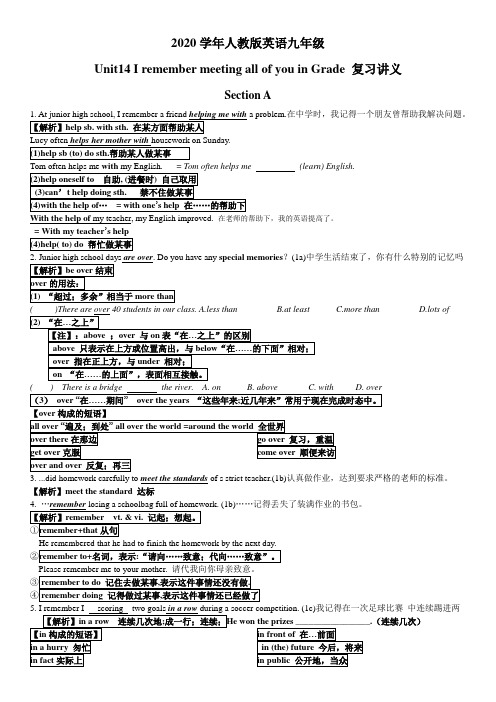
2020学年人教版英语九年级Unit14 I remember meeting all of you in Grade 复习讲义Section A在中学时,我记得一个朋友曾帮助我解决问题。
(learn) English.With the help of my teacher, my English improved. 在老师的帮助下,我的英语提高了。
special memories ?(1a)中学生活结束了,你有什么特别的记忆吗C.more thanD.lots of【over 构成的短语】3. ...did homework carefully to meet the standards of s strict teacher.(1b)认真做作业,达到要求严格的老师的标准。
【解析】meet the standard 达标……记得丢失了装满作业的书包。
我记得在一次足球比赛 中连续踢进两(连续几次)(2c)Read the instruction carefully before you take this medicine.服用此药前请认真阅读说明1. You have to be ______ and wait until I finish my work.A. patient B. strict C. honest D. activethe answers yourselfno matter how difficult they were.(2d)小杰克想出的主意很有效。
No matter how difficult things seem to be, you should say to _____ “Never mind!” A positive attitude is the key to success. A. themselvesB. ourselvesC. yourselves’t understand anything.s go to the movies ,__________?14.Looking back at these past three years(3a) 我记得回望过去的三年。
英语九年级全一册unit14知识点
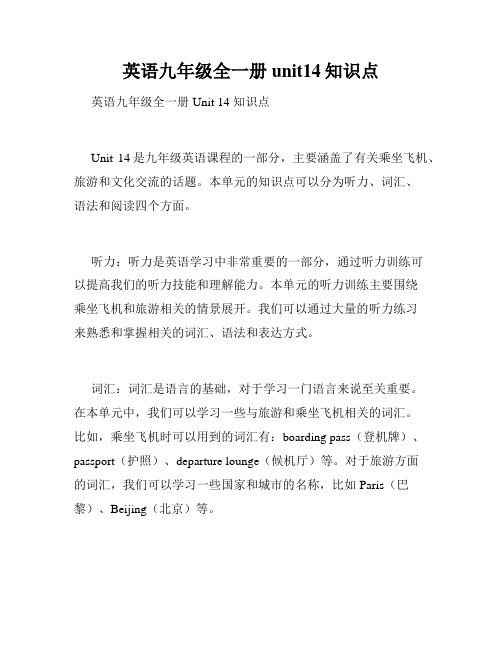
英语九年级全一册unit14知识点英语九年级全一册Unit 14 知识点Unit 14是九年级英语课程的一部分,主要涵盖了有关乘坐飞机、旅游和文化交流的话题。
本单元的知识点可以分为听力、词汇、语法和阅读四个方面。
听力:听力是英语学习中非常重要的一部分,通过听力训练可以提高我们的听力技能和理解能力。
本单元的听力训练主要围绕乘坐飞机和旅游相关的情景展开。
我们可以通过大量的听力练习来熟悉和掌握相关的词汇、语法和表达方式。
词汇:词汇是语言的基础,对于学习一门语言来说至关重要。
在本单元中,我们可以学习一些与旅游和乘坐飞机相关的词汇。
比如,乘坐飞机时可以用到的词汇有:boarding pass(登机牌)、passport(护照)、departure lounge(候机厅)等。
对于旅游方面的词汇,我们可以学习一些国家和城市的名称,比如Paris(巴黎)、Beijing(北京)等。
语法:语法是英语学习中不可忽视的一部分,掌握正确的语法规则可以让我们的表达更加准确和流利。
在本单元中,我们可以学习一些关于时间和地点的语法知识。
比如,如何正确使用介词in、on和at来表示时间和地点。
例如,在表示具体时间时,我们可以说in the morning(早上)、on Monday(星期一)等。
阅读:阅读是提高英语水平的重要途径之一,通过阅读,我们可以扩大词汇量,提高语感以及理解能力。
在本单元中,我们可以阅读一些关于旅游和文化交流的文章。
通过阅读这些文章,我们可以了解不同国家和城市的文化特点,了解他们的传统和习俗。
除了以上四个方面的知识点,本单元还涉及到其他一些综合性的技能,比如口语表达、写作和翻译等。
这些技能在英语学习中同样非常重要,可以通过大量的练习来提高自己的能力。
总之,英语九年级全一册Unit 14 是一个非常实用和有趣的单元,通过学习这些知识点,我们可以掌握乘坐飞机和旅游的相关知识,提高听力、词汇、语法和阅读能力,从而更好地应对各种英语交流和应用的场景。
人教版九年级英语Unit14单元知识点总结
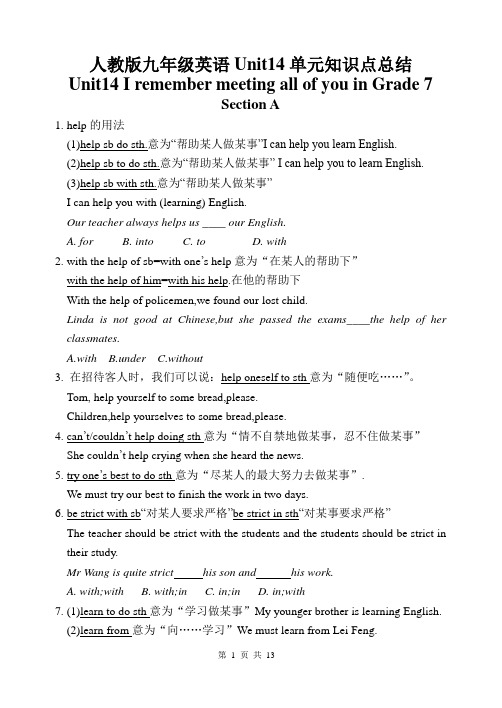
人教版九年级英语Unit14单元知识点总结Unit14 I remember meeting all of you in Grade 7Section A1. help的用法(1)help sb do sth.意为“帮助某人做某事”I can help you learn English.(2)help sb to do sth.意为“帮助某人做某事” I can help you to learn English.(3)help sb with sth.意为“帮助某人做某事”I can help you with (learning) English.Our teacher always helps us ____ our English.A. forB. intoC. toD. with2. with the help of sb=with one’s help意为“在某人的帮助下”with the help of him=with his help.在他的帮助下With the help of policemen,we found our lost child.Linda is not good at Chinese,but she passed the exams____the help of her classmates.A.withB.underC.without3. 在招待客人时,我们可以说:help oneself to sth意为“随便吃……”。
Tom, help yourself to some bread,please.Children,help yourselves to some bread,please.4. can’t/couldn’t help doing sth意为“情不自禁地做某事,忍不住做某事”She couldn’t help crying when she heard the news.5. try one’s best to do sth意为“尽某人的最大努力去做某事”.We must try our best to finish the work in two days.6. be strict with sb“对某人要求严格”be strict in sth“对某事要求严格”The teacher should be strict with the students and the students should be strict in their study.Mr Wang is quite strict his son and his work.A. with;withB. with;inC. in;inD. in;with7. (1)learn to do sth意为“学习做某事”My younger brother is learning English.(2)learn from意为“向……学习”We must learn from Lei Feng.(3)learn by oneself意为“自学”He learns French by himself.(4)learn about意为“了解,知道”The more you learn about the Chinese history,the more you enjoy living in China.8. 乐器前必须加定冠词the,球类运动前不加任何冠词。
人教版九年级英语Unit 14知识点
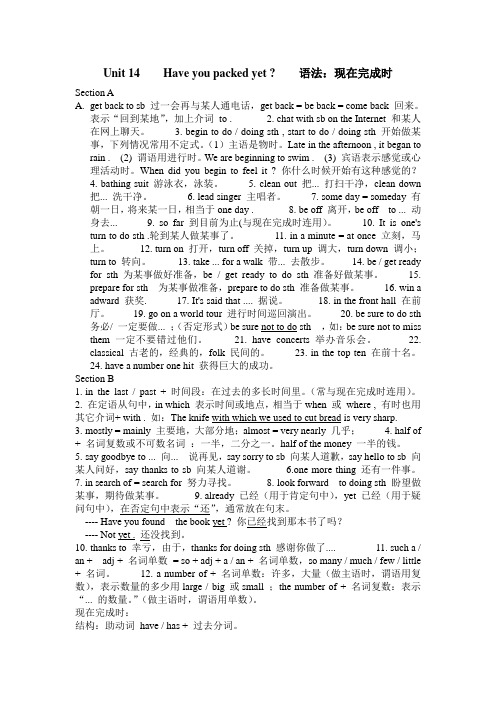
Unit 14 Have you packed yet ? 语法:现在完成时Section AA.get back to sb 过一会再与某人通电话,get back = be back = come back 回来。
表示“回到某地”,加上介词to . 2. chat with sb on the Internet 和某人在网上聊天。
3. begin to do / doing sth , start to do / doing sth 开始做某事,下列情况常用不定式。
(1)主语是物时。
Late in the afternoon , it began to rain . (2) 谓语用进行时。
We are beginning to swim . (3) 宾语表示感觉或心理活动时。
When did you begin to feel it ? 你什么时候开始有这种感觉的?4. bathing suit 游泳衣,泳装。
5. clean out 把... 打扫干净,clean down把... 洗干净。
6. lead singer 主唱者。
7. some day = someday 有朝一日,将来某一日,相当于one day . 8. be off 离开,be off to ... 动身去... 9. so far 到目前为止(与现在完成时连用)。
10. It is one's turn to do sth .轮到某人做某事了。
11. in a minute = at once 立刻,马上。
12. turn on 打开,turn off 关掉,turn up 调大,turn down 调小;turn to 转向。
13. take ... for a walk 带... 去散步。
14. be / get ready for sth 为某事做好准备,be / get ready to do sth 准备好做某事。
Unit 14 知识清单 人教版九年级英语全册
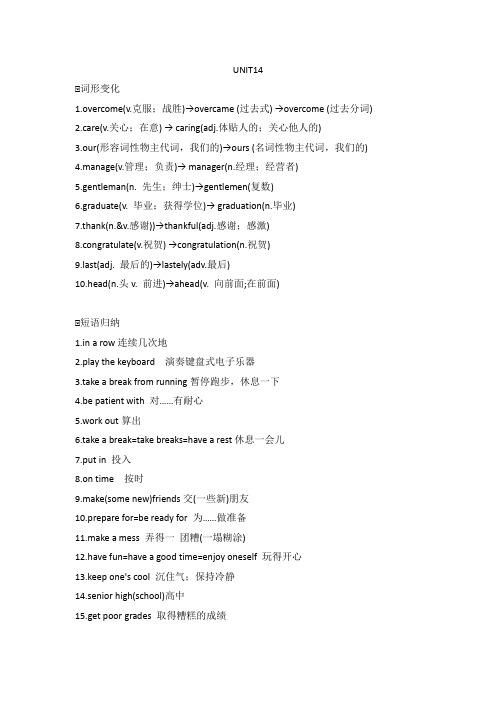
UNIT14▶词形变化1.overcome(v.克服;战胜)→overcame (过去式) →overcome (过去分词)2.care(v.关心;在意) → caring(adj.体贴人的;关心他人的)3.our(形容词性物主代词,我们的)→ours (名词性物主代词,我们的)4.manage(v.管理;负责)→ manager(n.经理;经营者)5.gentleman(n. 先生;绅士)→gentlemen(复数)6.graduate(v. 毕业;获得学位)→ graduation(n.毕业)7.thank(n.&v.感谢))→thankful(adj.感谢;感激)8.congratulate(v.祝贺) →congratulation(n.祝贺)st(adj. 最后的)→lastely(adv.最后)10.head(n.头v. 前进)→ahead(v. 向前面;在前面)▶短语归纳1.in a row连续几次地2.play the keyboard 演奏键盘式电子乐器3.take a break from running暂停跑步,休息一下4.be patient with 对……有耐心5.work out算出6.take a break=take breaks=have a rest休息一会儿7.put in 投入8.on time 按时9.make(some new)friends交(一些新)朋友10.prepare for=be ready for 为……做准备11.make a mess 弄得一团糟(一塌糊涂)12.have fun=have a good time=enjoy oneself 玩得开心13.keep one's cool 沉住气;保持冷静14.senior high(school)高中15.get poor grades 取得糟糕的成绩16.have problems/difficulty/trouble with sth.在某事上有困难/问题17.go by(时间)逝去;过去18.at the end of在… … 末19.get a business degree 获得商科学位20.believe in 信任;信赖21.accept the invitation接受邀请22.attend the graduation ceremony参加毕业典礼23.first of all 首先(近:atfirst起初)24.be full of=be filled with充满……;装满……25.be thirsty for 渴望;渴求26.deal with=do with处理27.grow up长大28.be proud of=take pride in为……感到骄傲29.none of… 没有一个… …30.the end of………的末尾31.the beginning of=the start of………的开始32.ahead of在… … 前面33.make mistakes(in.…)( 在…方面) 犯错误34.learn(…)from … 向/从…学习35.give up 放弃36.along with 连同;除……以外还37.wait for 等待38.make one's own choices作出某人自己的选择39.be responsible for 对……有责任;负责任40.go one's separate ways分道扬镳41.set out=set off出发;启程42.separate from 分离;隔开43.get into 进入44.share…with… 和… … 分享/分担……45.with one's help=with the help of sb.在某人的帮助下46.change one's life 改变某人的生活47.in a few years’ time 几年以后48.be thankful to sb.对某人心存感激49.(meet)the standard of (达到) …的标准/水平50.no matter how/who/when/where无论怎样/ 谁/ 何时/ 何地51.look back at 回首( 往事) ; 回忆;回顾52.each other=one another 互相;彼此53.do/make a survey 做调查▶用法集萃1.remember to do sth记得要做某事remember doing sth记得做过某事2.advise doing sth. 建议做某事advise sb to do sth. 建议某人做某事3.guide sb.to do sth. 指导某人做某事ed to do sth. 过去常常做某事5.look forward to doing sth. 期盼做某事6.need to do sth. 需要做某事need sb.to do sth. 需要某人做某事need doing… 需要被做……7.learn to do sth. 学会做某事hope to do sth. 希望做某事fail to do sth. 未能做成某事try to do sth. sth.尽力做某事8.would like to do sth. 想做某事be excited to do sth. 做某事很兴奋have the ability to do sth. 有能力做某事9.Shall I/we do sth? 我/我们做某事好吗?10.It’s time(for sb.) to do sth. 到了(某人)做某事的时候。
人教版英语九年级全册期末Unit14 单元知识点总结

Unit14 单元知识点总结1. do/make a survey of public attitude做了一个民意调查2.standard of living=living standard生活水平meet the standard of sb.3 in a row连续几次地The school basketball team has won three times in a row.stand in a row站成一排stand in line排队cut in line 插队4.play the keyboard弹琴keyboard键盘monitor显示器;监控器;班长mouse鼠标play the+乐器play+球类/棋类the method/way to do sth the method/way of doing sth...的方法5.instruction说明introduction 介绍1)与教学相关,课堂讲解,指导要求,用复数。
2)仪器,药物的用法说明,使用说明,与direction通用。
6.double triple 三倍的I think we can double our marks in one year.a double bed adj. 双人床7.shall用于第一人称we/I.口语中可换为will.Shall we do sth?表建议=What/How about doing sth?=Why not do sth=W hy don’t you do sth?=Would you like to do sth?=You’d better do sth=Let’s do sth=Could you please do sth=Would you mind doing sth8.overcome=get over克制overcome shortcomings/difficulty/weak nessbe overcome by被...所压倒The fire was completely overcome.9.make a mess of sth 把...弄得一团糟(be) in mess乱七八糟get into a mess陷入困境get sb into a mess使某人陷入糟糕的处境mess up搞乱10.graduate from 从...毕业He graduated from Peking University.graduate in sth从...专业毕业She graduated in Japanese.她从日语系毕业了11.keep one’s cool=keep one’s head=keep calm=keep cool=calm down冷静反义词lose one’s temper发脾气12.caring1).take care=be careful= look out小心,留神,可以用作take care that…或者take care to do sth.Take care〔that〕you don’t drink too much. 留神别喝多了。
人教版九年级 unit 14 知识点

人教版九年级 unit 14 知识点年 U14I remember meeting all of you in Grade 7.一、必会单词survey n.调查standard n.标准;水平row n.一排;一列;一行keyboard n.键盘式电子乐器;键盘method n.方法;措施instruction n.指示;命令double v. 加倍;是…的两倍a两倍的;加倍的shallmodal v.将要;将会overcome v.克服;战胜graduate v.毕业;获得学位caring adj.体贴人的;关怀他人的ourspron.我们的senior adj.级别〔或地位〕高的text n.课文;文本level n.水平degree n.〔大学〕学位;度数;程度manager n.经理;经营者gentleman n.先生;绅士graduation n.毕业ceremony n.典礼;仪式congratulate.祝福thirsty adj 渴望的;口渴的thankful adj感激;感激lastly adv.最后task n.任务;工作ahead adv.向前面;在前面responsible adj.有责任心的separate adj小单独的;别离的,v.分开,别离wing n.翅膀;翼二、常考短语、用法in a row连续几次地look back at回首〔往事〕;回忆;回忆make a mess弄得一团槽〔一塌糊涂〕keep one’s cool 沉住气;保持冷静senior high〔 school〕高中go by〔时间〕逝去;过去believe in信托;信赖first of all首先be thirsty for渴望;渴求be thankful to X.对某人心存感激ahead of在…前面along with连同;除……以外还be responsible for对…有责任;负责任set out出发;启程separate from别离;隔开play the keyboard 演奏键盘式电子乐器take a break from running暂停跑步,休息一下be patient with对…有耐心work out算出no matter how difficult无论多难put in投入on time按时make some new friends交一些新朋友prepare for为……做打算have fun玩得开心get poor grades取得糟糕的成绩have problems with sth.在某方面有困难at the end of the year在年底get a business degree 取得商科学位accept the invitation接受邀请attend the graduation ceremony参加毕业典礼be full of充满deal with处理grow up长大be proud of为……感到骄傲none of….没有一个…the end of……的末尾the beginning of..…的开始make mistakes犯错误learn from向…学习give up放弃along with连同;除…以外还wait for X.等待某人make your own choices 作出你自己的选择be responsible for对…有责任;负责任go your separate ways分道扬镳get into进入share... with..和…分享/分担…remember doing sth记得做过某事advise X. to do sth.建议某人做某事guide X. to do sth.指导某人做某事Shall we+动词原形….?我们做……好吗?It’s time to do sth.到了做某事的时间。
九年级英语全册Unit14IremembermeetingallofyouinGrade7必考知识点汇编素材新版人教新目标版

Unit14 必考知识点汇编1. A friend helping me with a problem帮助我解决问题的朋友(教材第105页)➢中考链接考查介词的用法(2020 •贵阳中考) Linda is not good at Chinese, but she passed the exam _____ the help of her classmates.A. withB. underC. without【答案】A【解析】考查介词的用法。
with the help of sb.表示“在某人的帮助下”。
句意:琳达不太擅长汉语,但是在同学们的帮助下,她通过了考试。
2. How have you changed since you started junior high school?自从你开始上中学你变化有多大?(教材第108页)➢中考链接考查动词时态的用法(2020 •北京中考) Miss Lin _____ a lot of work for the poor area since 2020.A. doesB. didC. has doneD. will do【答案】C【解析】考查动词时态的用法。
句意:自从2020年起林老师为贫困地区做了很多事。
由句中的since 时间状语可知,谓语要用现在完成时,故选C。
3. I remember being a volunteer.我记得成为了一名志愿者。
(教材第108页)➢中考链接考查remember的用法(2020 •绥化中考) Remember ______ off the lights when you leave the room, please.A. to turnB. turningC. turn【答案】A【解析】考查remember的用法。
句意:你离开房间时,请记得关灯。
remember to do sth.表示“记得去做某事”,事情还没有做;remember doing sth.表示“记得做过某事”,事情已经做过。
Unit+14单元知识点 人教版九年级英语全册+
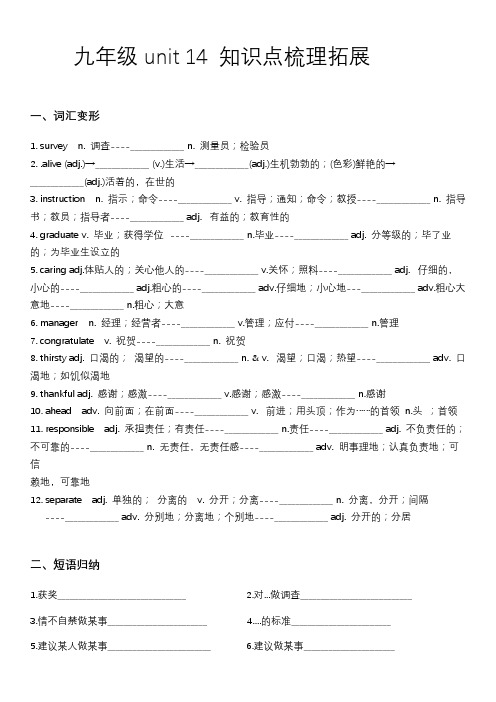
九年级unit 14 知识点梳理拓展一、词汇变形1. survey n. 调查----_____________ n. 测量员;检验员2. .alive (adj.)→_____________ (v.)生活→_____________(adj.)生机勃勃的;(色彩)鲜艳的→_____________(adj.)活着的,在世的3. instruction n. 指示;命令----_____________ v. 指导;通知;命令;教授----_____________ n. 指导书;教员;指导者----_____________ adj. 有益的;教育性的4. graduate v. 毕业;获得学位----_____________ n.毕业----_____________ adj. 分等级的;毕了业的;为毕业生设立的5. caring adj.体贴人的;关心他人的----_____________ v.关怀;照料----_____________ adj. 仔细的,小心的----_____________ adj.粗心的----_____________ adv.仔细地;小心地---_____________ adv.粗心大意地----_____________ n.粗心;大意6. manager n. 经理;经营者----_____________ v.管理;应付----_____________ n.管理7. congratulate v. 祝贺----_____________ n. 祝贺8. thirsty adj. 口渴的;渴望的----_____________ n. & v. 渴望;口渴;热望----_____________ adv. 口渴地;如饥似渴地9. thankful adj. 感谢;感激----_____________ v.感谢;感激----_____________ n.感谢10. ahead adv. 向前面;在前面----_____________ v. 前进;用头顶;作为……的首领n.头;首领11. responsible adj. 承担责任;有责任----_____________ n.责任----_____________ adj. 不负责任的;不可靠的----_____________ n. 无责任,无责任感----_____________ adv. 明事理地;认真负责地;可信赖地,可靠地12. separate adj. 单独的;分离的v. 分开;分离----_____________ n. 分离,分开;间隔----_____________ adv. 分别地;分离地;个别地----_____________ adj. 分开的;分居二、短语归纳1.获奖_______________________________2.对...做调查___________________________3.情不自禁做某事________________________4....的标准________________________7.休息一会__________________=____________________=______________________8.高中__________________________________ 9.给某人写信_______________________10.主动提出做某事_____________________ 11.取的好成绩_______________________12.对...有耐心__________________________ 13.计算出,解决_______________________14.回首,回顾,回忆_______________________ 15.努力,尽力,设法做某事______________16. 弄得一团糟________________________ 17.保持冷静,沉住气_____________________18.在做某事方面有困难_____________________ 19.信任,信赖____________________________20.因做某事而感谢_________________________ 21.首先________________________________22.渴望,渴求...._____________________________ 23.处理...____________/_______________24.在...的前面______________________________ 25.分离,隔开__________________________26.出发,启程______________________________ 27.除了做...以外,别无选择_____________28.对...有责任____________________________ 29.有做某事的能力____________________三、知识详解1.survey此处用作可数名词,意为“调查”。
- 1、下载文档前请自行甄别文档内容的完整性,平台不提供额外的编辑、内容补充、找答案等附加服务。
- 2、"仅部分预览"的文档,不可在线预览部分如存在完整性等问题,可反馈申请退款(可完整预览的文档不适用该条件!)。
- 3、如文档侵犯您的权益,请联系客服反馈,我们会尽快为您处理(人工客服工作时间:9:00-18:30)。
2020人教版九年级英语全册知识点Unit14I remember meeting all of you in Grade 7 Section A1. in a row连续几次地eg: This is her third win in a row.排成一排eg:They were standing neatly in a row.2.work out算出eg:He couldn't work out the math problem.发展,进行eg:Everything worked out fine.解决eg:She worked out the problem with his help.制订We worked out a plan very soon.3.put in more effort投入更多的努力eg:I put in more effort to improve the safety of the work place.put in投入,花费eg:I've put a lot of energy in improving my English.安装eg:We put in a new air conditioner when we moved here.4.ptake pride in=be proud of对……感到骄傲;eg:I took pride in Chinese inventions after visiting the museum last week.5.prepareprepare (for) ...(为……)做准备=get ready foreg:The students are getting ready for the coming sports meeting.eg:The students are preparing for the coming sports meeting.prepare ... for ...为……准备……=get ... ready for ...eg:Mother is getting a birthday cake ready for my birthday.eg:Mother is preparing a birthday cake for my birthday.prepare to do sth.准备做某事=get ready to do sth.eg:You should get ready to have the P.E. class.eg:You should prepare to have the P.E. class.6.make a mess弄得一团糟eg:She makes a mess of the job.mess 短语in a mess杂乱不堪;陷入困境eg:He found his room in a mess.mess up 把……弄糟7.It's time(for sb.)to do sth.到(某人)该做某事的时候了eg:It's time for me to cook breakfast.8.graduatev.毕业短语graduate from...从……毕业eg:He graduated from a college last year.9.一般现在时经常性的动作或当前的状态常与sometimes,often,usually,always,every day,once a week...连用一般现在时代替一般将来时连词if,unless 引导的条件状语从句eg:If a pan of oil catches fire,turn off the gas and cover the pan quickly.10.一般过去时过去某一时间发生的动作或存在的状态与yesterday,last week,two months ago,in 1990...连用eg:Tom finished his homework yesterday.11.一般将来时将来发生的动作或情况常与tomorrow,next day,in the future等连用eg:I'll visit the museum tomorrow.am/is/are going to +V.原表示主语打算在最近或将来要做某事eg:What are you going to do tomorrow ?表示有迹象表明某事将要发生eg:Look at the dark clouds. There is going to be a heavy rain.Section B1.believe in信任;信赖辨析believe in信任某人,相信某人的价值,可指信仰,信奉(真理、宗教)等后+名词,代词作宾语eg:The students believe in John.believe相信某人所说的话,与这个人的品质无关后+名词、代词或从句eg:I believe what you said.短语believe it or not信不信由你2.congratulatev.祝贺常用短语congratulate on sb.向某人祝贺congratulate sb. on sth.为某事向某人祝贺3.辨析none可指人也可指物,常暗示一定范围通常与of 连用eg: None of us enjoy getting up early.no one只能指人不能与of 连用eg:No one knows about it.4.ahead of在……前面ahead短语go ahead表示同意对方的请求eg:—May I start ?—Yes,go ahead.ahead of更早,早于,领先eg:He left one day ahead of me.ahead of time提前,提早eg:The work was done ahead of time.5.along with连同;除……以外还=together with就远原则eg: Lucy along with her parents is going to Shanghai next month.6.responsibleadj.有责任心的eg:My Chinese teacher is a responsible man.短语be responsible for sth.对某事负责任eg:Who is responsible for the project ?be responsible to sb.对某人负责eg:Our duty is to be responsible to the people.7.separateadj.单独的,分离的eg:They sleep in separate beds.v.分开,分离常与from 连用eg:Please separate the white shirts from the colored ones.辨析separate把原来连在一起的分隔开来常和from 连用eg:The fence separates the garden from the yard.divide把整体分成若干部分常和介词into 连用eg:The apple is divided into two parts.8.set out出发;启程=set off短语set out for ...出发前往……set out to do sth.开始(着手)做某事Section A1. in a row连续几次地eg: This is her third win in a row.排成一排eg:They were standing neatly in a row.2.work out算出eg:He couldn't work out the math problem.发展,进行eg:Everything worked out fine.解决eg:She worked out the problem with his help.制订We worked out a plan very soon.3.put in more effort投入更多的努力eg:I put in more effort to improve the safety of the work place.put in投入,花费eg:I've put a lot of energy in improving my English.安装eg:We put in a new air conditioner when we moved here.4.ptake pride in=be proud of对……感到骄傲;eg:I took pride in Chinese inventions after visiting the museum last week.5.prepareprepare (for) ...(为……)做准备=get ready foreg:The students are getting ready for the coming sports meeting.eg:The students are preparing for the coming sports meeting.prepare ... for ...为……准备……=get ... ready for ...eg:Mother is getting a birthday cake ready for my birthday.eg:Mother is preparing a birthday cake for my birthday.prepare to do sth.准备做某事=get ready to do sth.eg:You should get ready to have the P.E. class.eg:You should prepare to have the P.E. class.6.make a mess弄得一团糟eg:She makes a mess of the job.mess 短语in a mess杂乱不堪;陷入困境eg:He found his room in a mess.mess up 把……弄糟7.It's time(for sb.)to do sth.到(某人)该做某事的时候了eg:It's time for me to cook breakfast.8.graduatev.毕业短语graduate from...从……毕业eg:He graduated from a college last year.9.一般现在时经常性的动作或当前的状态常与sometimes,often,usually,always,every day,once a week...连用一般现在时代替一般将来时连词if,unless 引导的条件状语从句eg:If a pan of oil catches fire,turn off the gas and cover the pan quickly.10.一般过去时过去某一时间发生的动作或存在的状态与yesterday,last week,two months ago,in 1990...连用eg:Tom finished his homework yesterday.11.一般将来时将来发生的动作或情况常与tomorrow,next day,in the future等连用eg:I'll visit the museum tomorrow.am/is/are going to +V.原表示主语打算在最近或将来要做某事eg:What are you going to do tomorrow ?表示有迹象表明某事将要发生eg:Look at the dark clouds. There is going to be a heavy rain. Section B1.believe in信任;信赖辨析believe in信任某人,相信某人的价值,可指信仰,信奉(真理、宗教)等后+名词,代词作宾语eg:The students believe in John.believe相信某人所说的话,与这个人的品质无关后+名词、代词或从句eg:I believe what you said.短语believe it or not信不信由你2.congratulatev.祝贺常用短语congratulate on sb.向某人祝贺congratulate sb. on sth.为某事向某人祝贺3.辨析none可指人也可指物,常暗示一定范围通常与of 连用eg: None of us enjoy getting up early.no one只能指人不能与of 连用eg:No one knows about it.4.ahead of在……前面ahead短语go ahead表示同意对方的请求eg:—May I start ?—Yes,go ahead.ahead of更早,早于,领先eg:He left one day ahead of me.ahead of time提前,提早eg:The work was done ahead of time.5.along with连同;除……以外还=together with就远原则eg: Lucy along with her parents is going to Shanghai next month.6.responsibleadj.有责任心的eg:My Chinese teacher is a responsible man.短语be responsible for sth.对某事负责任eg:Who is responsible for the project ?be responsible to sb.对某人负责eg:Our duty is to be responsible to the people.7.separateadj.单独的,分离的eg:They sleep in separate beds.v.分开,分离常与from 连用eg:Please separate the white shirts from the colored ones.辨析separate把原来连在一起的分隔开来常和from 连用eg:The fence separates the garden from the yard.divide把整体分成若干部分常和介词into 连用eg:The apple is divided into two parts.8.set out出发;启程=set off短语set out for ...出发前往……set out to do sth.开始(着手)做某事。
